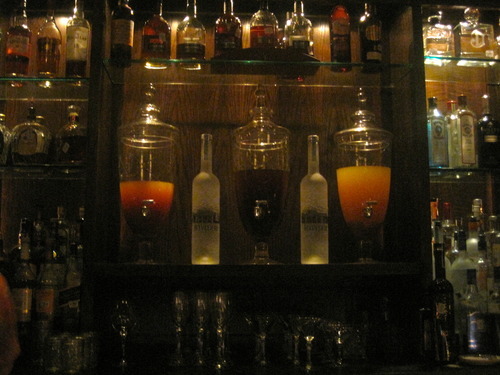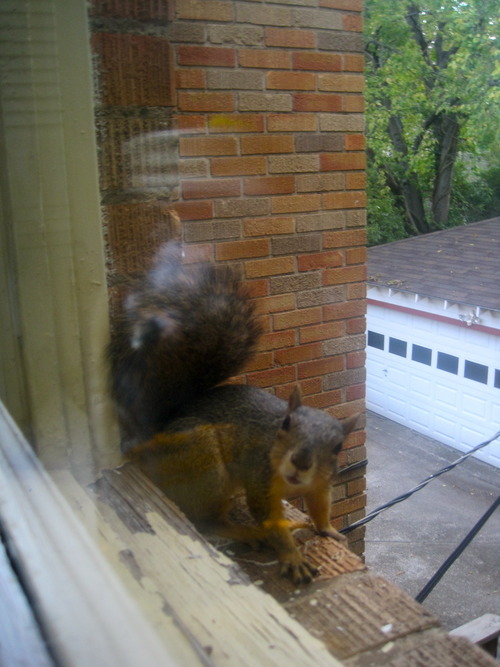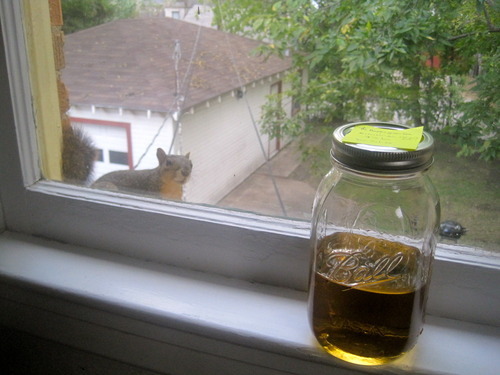Three o’clock was always tea hour for chef Lisa Garza. That’s how it was growing up in Memphis. “Teas are such a big part of the South,” she says.
These days, they’re a big part of the cocktails that Garza features at Sissy’s Southern Kitchen, her restaurant on Dallas’ Henderson Avenue
As liquor-store shelves run clear with the blood of sweet-tea-flavored vodkas, odds are you’ve noticed a tea-accented cocktail or two on the menu of your local craft bar. But I’m betting you haven’t seen anyone devoting eight feet of space to them, as Sissy’s has: Two sets of glass apothecary jars dominate shelves built to accommodate their hefty dimensions.
“We built that bar around featuring the teas,” Garza said. “We gave up a lot of space to do that.”
In each, Belvedere vodka is the featured spirit. The Tipsy Arnold Palmer, infused with Japanese green and Chinese black tea, is flavored with orange, pineapple and safflower; Japan green also powers the Sencha Goji, which includes pomegranate, blueberry, lemongrass, cornflower and Goji berry.
The custom-ordered tea blends are part of Sissy’s carefully thought-out Southern identity. Orange pekoe tea even sparks the restaurant’s Kentucky Punch along with Maker’s Mark bourbon and blood orange liqueur. “This is our brand DNA,” Garza says. “This is the culture we’ve created.”

Personally, tea isn’t something I crave in my cocktails, and I tend to skip right over them on drink lists. But there’s something about a hot summer day that lets a Tipsy Arnold Palmer pull just the right lever, or a cold winter one that makes a chamomile-spiced tipple sound like a reasonable choice.
Tea’s pairing with alcohol has made long strides since the British wielded it in party-worthy punches in the 17th century. With the rise of today’s craft cocktail movement, greens, whites, blacks and herbals have been reinstated in service of bolder spirits than vodka: Here in Dallas, Salum’s High Tea blends vodka, Pama liqueur and a bit of ginger beer with cinnamon/cardamon-spiced tea, and at Tate’s, in Uptown, head barman J.W. Tate united gin with Earl Grey to create a drink called the Remedy, mixed with egg white, lemon, honey syrup and grapefruit bitters. “It’s a nice cocktail for when you’re a little under the weather,” he said.
Everyone’s doing it, and so can you. But don’t think it’s as easy as setting a jar of gin out on the porch with a handful of tea bags on a hot afternoon.
“When it comes to infusions, it’s pretty much the Wild West right now,” says Mate Hartai, the wizard behind the counter at Lower Greenville’s Libertine Bar. “Everybody’s throwing everything into anything. But it’s one of those things – like chess, it’s easy to play, but impossible to master.”
That’s because alcohol is pretty much a liquid succubus. “It draws things out much more completely,” Hartai says. “That’s why infusions work.”
It happens fast, too. Tea is an eager and delicate flower, figuratively and sometimes literally. Lose focus, and you could end up with tannic sludge. Lipton bags conquer a bottle of vodka within minutes. Hartai once left a whole box of tea bags in a liter of gin for four days. “It was black by the end, horrible,” he says. “I had to throw it away.”
So, things to consider if you’re trying this at home – the balance of spirit and tea flavors, as well as the proof of the alcohol. An 80-percent-proof rum, for example, will infuse more quickly than a 60-percent vermouth.
The makeup of the tea matters, too. A packet of shredded tea ingredients could take just hours, while a homemade blend of mostly intact items and, say, dried fruit, could take a day or two. Sissy’s tea-infused spirits are more patient concoctions, infused overnight with smaller amounts of black, white or green whole-leaf teas and aromatics like ginger and orange. “Sometimes it just pops off,” Hartai says.
He recommends finding a tea you like and using a spirit that lacks that flavor. A ginger-tea-and-peach-infused Cocchi Americano he made succeeded because the Italian aperitif wine was so bitter to begin with. And bitter teas go best with spirits or liqueurs absent bitterness.
White vermouth is a worthy vehicle. “It’s light and sweet, and it won’t extract as much because it’s not as high-proof,” Hartai says. “It’ll be a lot more delicate and light. Just drop a couple of ice cubes into it and drink it by itself.”
On the other hand, he avoids vodkas. “At that point you’re just making a really low-proof tincture,” he says. “It’s such a neutral flavor. You’re literally just going to have to throw lots of sugar in there to make it palatable…. Besides, there’s plenty of iced-tea vodkas out there already; they’ve already done all the work.”
It’s a matter of focus, adjustment and trial-and-error, taking care not to over-steep. As I write, I have a small batch of Beefeater gin in the kitchen gettin’ friendly with green tea, a sort of earthy meets botanical experiment that I’m guessing will consummate within a few hours. Or maybe not. I’ll find out.

“YOU DID WHAT WITH THAT GIN?” My resident squirrel seems to say.
Tea, Hartai says, “is going to be completely different in a spirit, because you’re not brewing, you’re extracting. It’s definitely a beast, but you can add nice complexity to everything from an Old Fashioned to a Tom Collins.”
And infusing a sweet spirit or liqueur with something bitter is way more complex than the other way around. “Adding bitterness to anything is very difficult, because you can’t take it out once it’s in,” he says.
In an article for Readymade magazine, New York bartender Alex Day noted that tea can enrich alcohol in several modes – either steeped in the liquor itself, used as a base for syrup or simply brewed and added as an ingredient.
The delicate and clean botanicals of gin, he said, marry well with green teas and oolongs, while whiskeys, aged brandies, amari and some fortified wines couple best with aggressive flavors like black tea or herbal infusions. Chai and sweet vermouth, he said, are an especially good pairing.
Whatever you use, here’s some tips to help you through.
* Use teas you like to flavor spirits or liqueurs that lack that flavor.
* Hit up local herb shop to craft blends. For an infused vermouth, Hartai custom-ordered a blend of dried lavender, cranberry, violet and black tea.
* Simplicity is better. “It becomes very difficult to throw a bunch of things into something and expect it to come out good,” Hartai says. “That’s the problem with three-, or four-, or five-ingredient infusions. Everything’s getting lost. It’s becoming alcoholic fruit punch.”
* Experiment in small batches. “Micros,” he says. “That’s how brewers and distillers work.”
* Use good quality tea. As Day wrote for Readymade: “A cocktail can only be as good as what’s put into it.”
POSTSCRIPT
I meant to check the green-tea-and-gin mixture before I headed out for a movie, but then forgot. When I returned — more than seven hours after I first threw the bag in — the mix was a soothing shade of grassy greenish brown. I removed the bag and poured a sip. The result was a cloying smack in the mouth, an initial spritzy-sweet burn that settled into warm fireplace comfort. Not perfect, but I’m looking forward to sipping more on a cool evening sometime in the near future.

— Marc Ramirez, posted 10-23-12